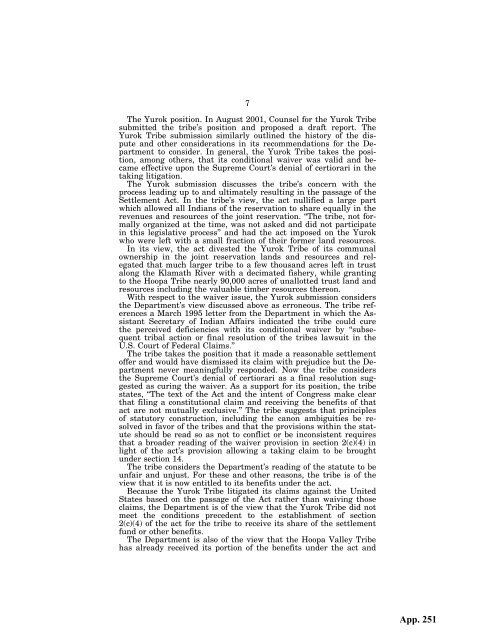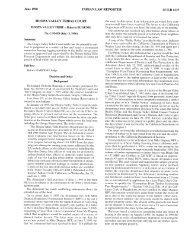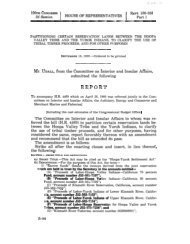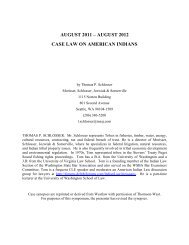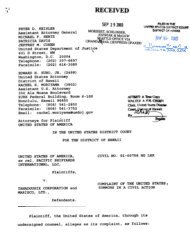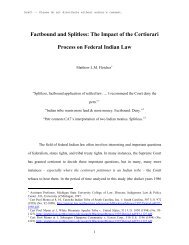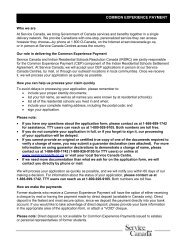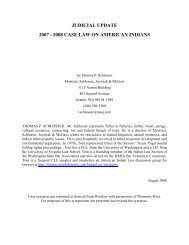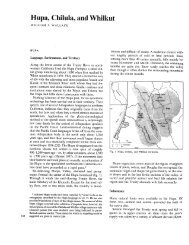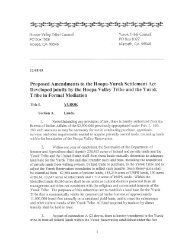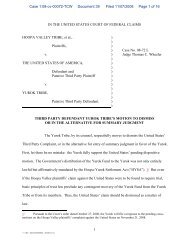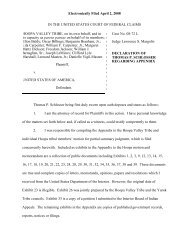Hoopa appendix supporting summary judgment - Schlosser Law Files
Hoopa appendix supporting summary judgment - Schlosser Law Files
Hoopa appendix supporting summary judgment - Schlosser Law Files
Create successful ePaper yourself
Turn your PDF publications into a flip-book with our unique Google optimized e-Paper software.
7<br />
The Yurok position. In August 2001, Counsel for the Yurok Tribe<br />
submitted the tribe’s position and proposed a draft report. The<br />
Yurok Tribe submission similarly outlined the history of the dispute<br />
and other considerations in its recommendations for the Department<br />
to consider. In general, the Yurok Tribe takes the position,<br />
among others, that its conditional waiver was valid and became<br />
effective upon the Supreme Court’s denial of certiorari in the<br />
taking litigation.<br />
The Yurok submission discusses the tribe’s concern with the<br />
process leading up to and ultimately resulting in the passage of the<br />
Settlement Act. In the tribe’s view, the act nullified a large part<br />
which allowed all Indians of the reservation to share equally in the<br />
revenues and resources of the joint reservation. ‘‘The tribe, not formally<br />
organized at the time, was not asked and did not participate<br />
in this legislative process’’ and had the act imposed on the Yurok<br />
who were left with a small fraction of their former land resources.<br />
In its view, the act divested the Yurok Tribe of its communal<br />
ownership in the joint reservation lands and resources and relegated<br />
that much larger tribe to a few thousand acres left in trust<br />
along the Klamath River with a decimated fishery, while granting<br />
to the <strong>Hoopa</strong> Tribe nearly 90,000 acres of unallotted trust land and<br />
resources including the valuable timber resources thereon.<br />
With respect to the waiver issue, the Yurok submission considers<br />
the Department’s view discussed above as erroneous. The tribe references<br />
a March 1995 letter from the Department in which the Assistant<br />
Secretary of Indian Affairs indicated the tribe could cure<br />
the perceived deficiencies with its conditional waiver by ‘‘subsequent<br />
tribal action or final resolution of the tribes lawsuit in the<br />
U.S. Court of Federal Claims.’’<br />
The tribe takes the position that it made a reasonable settlement<br />
offer and would have dismissed its claim with prejudice but the Department<br />
never meaningfully responded. Now the tribe considers<br />
the Supreme Court’s denial of certiorari as a final resolution suggested<br />
as curing the waiver. As a support for its position, the tribe<br />
states, ‘‘The text of the Act and the intent of Congress make clear<br />
that filing a constitutional claim and receiving the benefits of that<br />
act are not mutually exclusive.’’ The tribe suggests that principles<br />
of statutory construction, including the canon ambiguities be resolved<br />
in favor of the tribes and that the provisions within the statute<br />
should be read so as not to conflict or be inconsistent requires<br />
that a broader reading of the waiver provision in section 2(c)(4) in<br />
light of the act’s provision allowing a taking claim to be brought<br />
under section 14.<br />
The tribe considers the Department’s reading of the statute to be<br />
unfair and unjust. For these and other reasons, the tribe is of the<br />
view that it is now entitled to its benefits under the act.<br />
Because the Yurok Tribe litigated its claims against the United<br />
States based on the passage of the Act rather than waiving those<br />
claims, the Department is of the view that the Yurok Tribe did not<br />
meet the conditions precedent to the establishment of section<br />
2(c)(4) of the act for the tribe to receive its share of the settlement<br />
fund or other benefits.<br />
The Department is also of the view that the <strong>Hoopa</strong> Valley Tribe<br />
has already received its portion of the benefits under the act and


